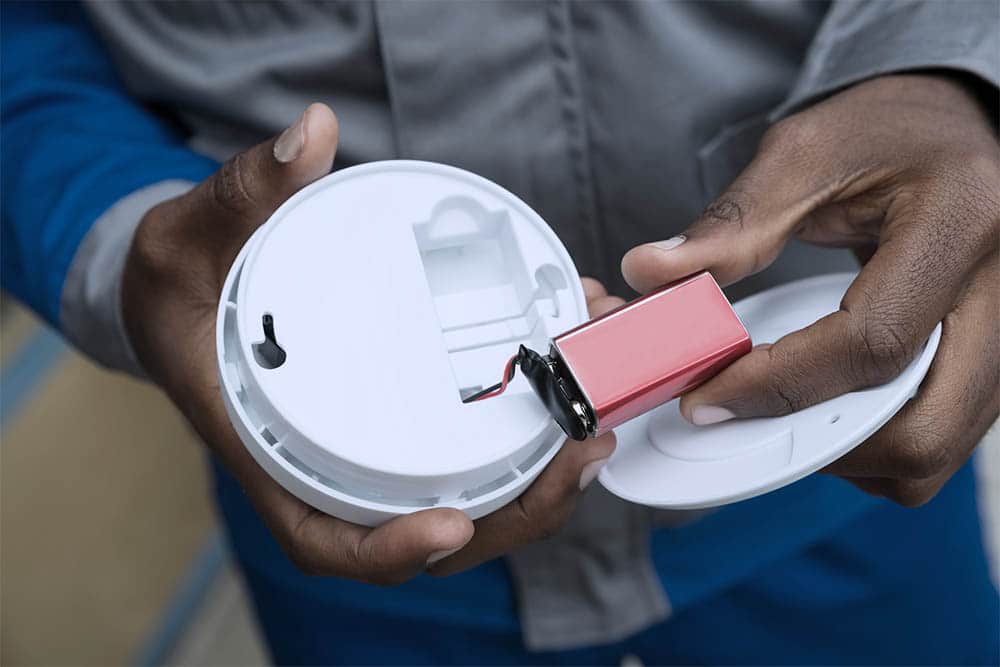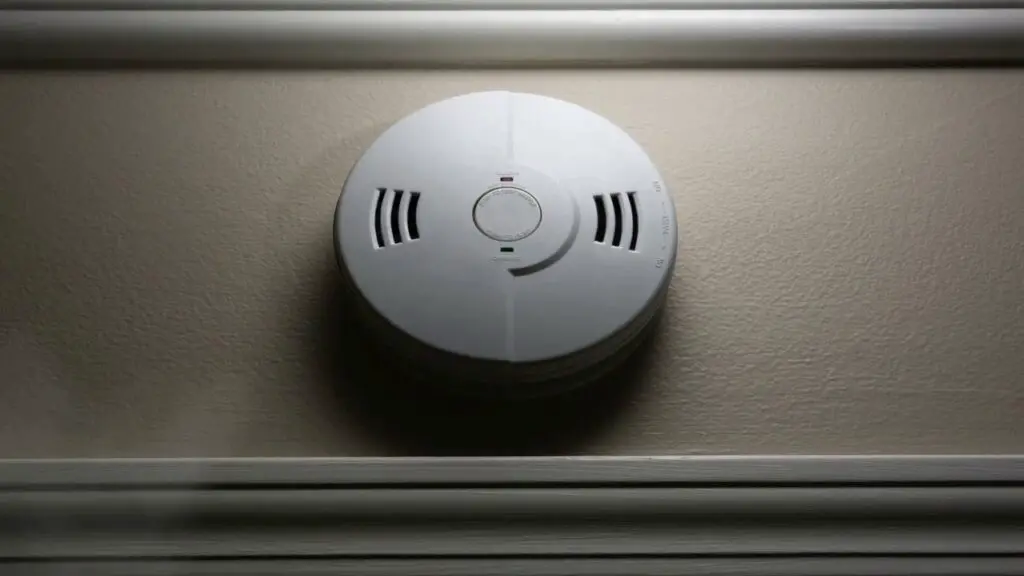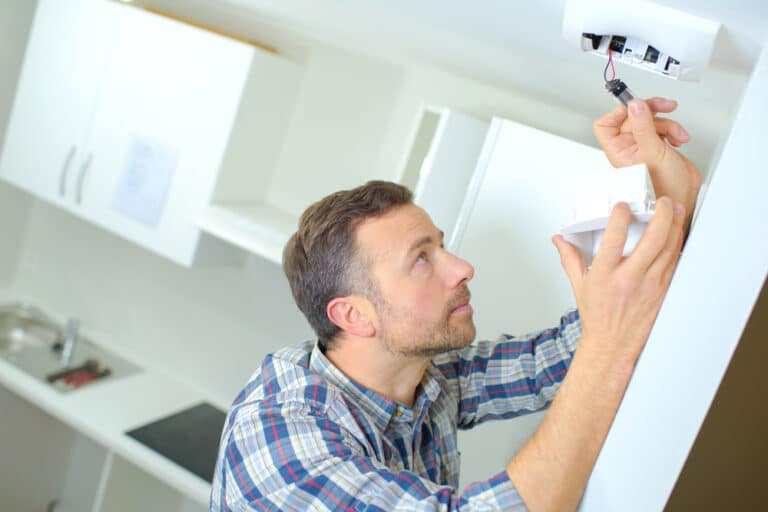Introduction
What Does 5 Beeps On A Smoke Detector Mean: Safety equipment like smoke detectors alert us to fires and smoke in our homes and workplaces. These devices have multiple alarm tones for different emergencies. Many people wonder what 5 smoke detector sounds indicate. This article will discuss the causes of this alarm pattern and what to do if you hear it.
Firstly, it is important to understand that three beeps smoke detectors are programmed to emit different alarm patterns for different situations. These patterns are designed to convey particular information about the nature of the situation. The number of beeps, the duration of the beeps, and the intervals between them can all vary depending on the brand and model of the smoke detector.
Smoke detectors with 5 beeps usually have low batteries. The smoke detector battery is low and has to be replaced. A smoke detector with a dead battery may not work when you need it most, so fix it right away. Smoke detector battery checks and replacements are easy yet essential to home and workplace safety. Some smoke detectors have a 5-beep pattern to indicate a malfunction or problem in addition to a low battery alert. Sensor failure or wiring issues could cause this. If the 5-beep pattern remains after replacing the battery, see the user manual or contact the manufacturer for further troubleshooting or a professional inspection or repair.

How do I stop my smoke detector from beeping 5 times?
Use the reset button: most smoke detectors have a red reset button. Hold the reset button down for approximately 15-20 seconds. When it resumes, it may chirp again, but the beeping should stop.
Your smoke detector ringing five times may indicate a problem. A beep indicates a problem with the detector or its environment. To protect your home and family, fix the problem right away. Here are some ways to stop your smoke detector from beeping 5 times.
- Check the batteries: Low batteries cause most smoke detector beeps. A buzzer means the battery needs replacing. Check the smoke detector batteries. It should be replaced if low or dead. Use the manufacturer-recommended battery.
- Clean the detector: Dust and debris can cause smoke detectors to malfunction and beep. Remove dust and grime from the detector using a soft brush or vacuum cleaner. Avoid damaging delicate parts during cleaning.
- After cleaning and reinstalling the battery: Test the detector to make sure it works. Hold the detector test button for a few seconds. If the detector beeps and alarms, it works. If not, a more serious issue may require professional intervention.
- Check environmental factors: High humidity or cooking steam might cause smoke detector false alarms. Place the detector away from heat, steam, and moisture. Place the detector somewhere if needed.
- Replace the detector: If none of the preceding techniques work and the detector beeps 5 times, replace it. Smoke detectors should be updated every 10 years or as advised by the manufacturer. Choose a new detector with modern technologies and the latest safety standards.
What does 5 beeps every 30 seconds mean on a carbon monoxide detector?
A carbon monoxide detector is an important device that helps protect you and your family from the dangers of carbon monoxide poisoning. It is designed to detect the presence of carbon monoxide gas in the air and alert you with an audible alarm. One common alarm pattern that you may encounter is 5 beeps every 30 seconds. This specific pattern indicates a particular situation that requires your attention.
Low batteries cause a carbon monoxide detector to beep 5 times every 30 seconds. Low batteries may prevent the detector from working properly and providing accurate data. To keep the detector working, replace the batteries immediately. Ignoring the low battery warning may cause the detector to miss high carbon monoxide levels.
The 5 sounds per 30 seconds pattern may vary by carbon monoxide detector manufacturer and model. Some detectors have distinct alarm patterns for low batteries or other concerns. Therefore, always consult the user manual or manufacturer for detector-specific information.
Take quick action if your carbon monoxide detector alarms 5 times every 30 seconds. Start with new batteries. Use the manufacturer-recommended battery type and size. Make that the detector works after changing the batteries. Pressing the test button on most detectors starts a self-test. If the alert sounds and stops after a few seconds, the detector is working.
In addition to battery replacement, your carbon monoxide detector must be clean and dust-free. Regularly inspect the detector for damage or malfunction. If you still hear 5 beeps every 30 seconds after replacing the batteries, the detector may have a worse problem. For more assistance, contact a skilled technician or the manufacturer.
Why did my smoke alarm beep 6 times?
It may be broken or need new batteries. Smoke and severe temperatures may potentially trigger the smoke detector. Never delay troubleshooting to keep your property fire-proof.
Every home needs smoke alarms to warn residents of fires or smoke. Smoke sensors in these gadgets sound an alarm to warn of potential hazard. When your smoke alarm beeps, especially many times, it can be worrisome. Your smoke alarm beeping six times could have various causes.
Low batteries may cause your smoke alarm to beep six times. Most smoke alarms use batteries, and when the battery is low, they beep to signal replacement. Your smoke alarm battery should be checked and replaced regularly to guarantee optimal operation.
A broken smoke alarm could cause six beeps. Smoke alarms, like other electronics, can develop difficulties. If your smoke alarm beeps six times, it may be broken or old. To protect yourself, replace the smoke alarm.
Six beeps may signal a false alarm. Smoke alarms are sensitive to smoke particles, although dust and steam can also trigger them. A innocent object may have triggered your smoke alarm six times without flames. The alarm must be checked for fire or smoke.
Finally, six beeps may indicate a significant situation. Some smoke alarms beep differently to signal sensor or wiring issues. If your smoke alarm sounds six times or acts strangely, contact a skilled electrician or the manufacturer.
Why did my smoke alarm beep 4 times?
4 Beeps, 5 second pause, repeat Off Off Condition: Non-originating CO Alarm. Recommendation: An interconnected CO alarm has sensed CO, causing all interconnected units to sound .If a hazard alarm rings, call 911 and leave the house.
Many things can cause your smoke alarm to beep four times. Understand that smoke alarms warn you of fires and smoke hazards. Beeping suggests a potential problem. The four beeps may indicate a specific issue that needs your attention.
The four beeps may indicate a low battery. Smoke alarms include battery backups to keep working during power outages. Smoke alarms beep when batteries are low to alert you to replace them. To keep the smoke alarm working, replace the battery immediately.
Four beeps could also indicate a smoke alarm issue. Like other electronics, smoke alarms can go down over time. If the smoke alarm beeps four times, its sensor or circuitry may be broken. In such circumstances, consult the user manual or contact the manufacturer for troubleshooting or replacement.
Additionally, the four beeps may indicate a specific hazard. Different smoke alarm beep patterns signal different threats. Four beeps could signal carbon monoxide instead of smoke. CO is colorless and odorless and very harmful. If your smoke alarm has a carbon monoxide detector, escape immediately if it sirens four times.
Your smoke alarm may beep four times owing to a low battery, malfunction, or carbon monoxide. To protect yourself and the smoke alarm, you must determine the reason of the beeping and take action.
How many beeps should a smoke detector have?
Smoke alarms alert you with three beeps in a row. Carbon monoxide alarms alert you with four beeps. A single chirp means the battery is low or the detector should be replaced.
Smoke detectors save lives by alerting residents to fires. Smoke detectors must beep to warn of danger. Several things affect a smoke detector’s beep count.
The number of smoke detector beeps is unregulated. Manufacturers employ different smoke detector sound patterns and frequencies. Most smoke detectors beep repeatedly to warn of fire or smoke.
Beeps depend on smoke detector type. Ionization and photoelectric smoke detectors dominate. Ionization smoke detectors detect blazing fires, photoelectric detectors smoldering ones. Smoke detector alert noises vary by fire type.
A smoke detector alert may sound more if the fire is severe. Smoke detectors may sound louder in dangerous situations. People can assess urgency and respond accordingly with this variance.
Smoke detectors warn inhabitants of fires and smoke hazards, not provide extensive information through beeps. No matter how many beeps, users must memorize their smoke detector’s alarm tone and rhythm. Emergency reliability requires regular smoke detector testing and maintenance.
Smoke detectors beep specific numbers to indicate situations. Smoke detectors usually sound three times for smoke and four for carbon monoxide, depending on brand and type. These sounds alert residents to flames and CO leaks.
The beeps notify neighboring households to act promptly. Knowing your smoke detector’s beep patterns can save lives in crises. Understanding the beeps enables you quickly identify the alarm type and evacuate or call 911.
What is the significance of five beeps on a smoke detector?
. The smoke detector battery is low and has to be replaced immediately. Ignoring this warning can cause the smoke detector to malfunction, endangering your safety.
This usually involves listening for smoke alarms or sounds in other rooms. Find and remove the smoke detector from its bracket.
Replace the battery next. For proper smoke detector operation, use a high-quality battery. To assure smoke detector operation, test it after changing the battery. Press the smoke detector test button and listen for the alert. Troubleshoot or replace the smoke detector if it doesn’t make a loud alarm sound.
Can you explain the different beep patterns and their corresponding meanings on a smoke detector?
A smoke detector typically emits different beep patterns to indicate specific situations. These beep patterns serve as important signals to alert individuals of potential dangers or issues related to the smoke detector.
One common beep pattern is a single beep every few minutes. This usually indicates a low smoke detector battery that needs replacement or recharging. This must be addressed immediately to guarantee the smoke detector detects smoke or fire.
Another beep pattern is a continuous, loud alarm sound. This indicates that the smoke detector has detected smoke or fire in the vicinity. When this beep pattern is heard, it is important to evacuate the premises immediately and contact emergency services. This beep pattern serves as a critical warning to ensure the safety of individuals and property.
What to do if a smoke detector alarms five times?
There are steps to take when a smoke detector alarms five times. Five smoke detector sounds indicate a low battery. Your smoke detector battery needs replacing after five beeps. To keep your smoke detector working, act immediately when you hear this beep pattern.
When you hear five beeps, you should first locate the smoke detector that is emitting the beeps. Once you have identified the smoke detector, you should remove it from its mounting bracket or ceiling and open the battery compartment. Check the battery to see if it is indeed low or dead. If the battery is low, replace it with a fresh one. It is recommended to use high-quality, long-lasting batteries to ensure the reliability of your smoke detector.
Is there a standard protocol or guideline to follow when a smoke detector produces five beeps?
When a smoke detector emits five beeps, it is important to follow a standard protocol or guideline to ensure the safety of everyone in the vicinity. These five beeps typically indicate a serious situation that requires immediate attention. One common scenario where five beeps are heard is when the smoke detector detects a high level of smoke or fire in the area.
Upon hearing five beeps from a smoke detector, it is crucial to take immediate action to protect yourself and others. The first step is to evacuate the premises as quickly and safely as possible. Alert everyone in the building and ensure that they are aware of the potential danger. It is important to remember not to waste any time gathering personal belongings or investigating the source of the smoke or fire.
Once outside, call emergency services and provide them with accurate information about the situation. This will help them respond promptly and effectively. It is essential to stay at a safe distance from the building until emergency personnel arrive and give the all-clear. Do not attempt to re-enter the premises until it is deemed safe to do so by the authorities.

Conclusion
If you hear 5 beeps on a smoke detector, it is important to take immediate action. This signal typically indicates a low battery, and it is crucial to replace the battery as soon as possible. Ignoring this warning can put you and your household at risk, as a smoke detector with a dead battery will not be able to alert you in the event of a fire. Therefore, it is essential to regularly check and replace the batteries in your smoke detectors to ensure their proper functioning.
Additionally, it is worth noting that the 5-beep smoke detectors signal may vary depending on the brand and model of your smoke detector. While a low battery is the most common cause, it is always a good idea to consult the user manual or contact the manufacturer for specific information about your device. They will be able to provide you with accurate instructions and troubleshooting tips to address the issue.
Lastly, it is crucial to remember that smoke detectors play a vital role in protecting your home and loved ones from the dangers of fire. Smoke detectors sound loud alarms to warn of danger. Regular maintenance, including testing the alarms and replacing batteries, is essential to ensure their effectiveness. By being proactive and addressing any issues promptly, you can have peace of mind knowing that your smoke detectors are functioning properly and providing the necessary protection for your household.

